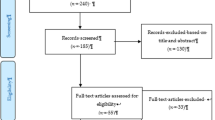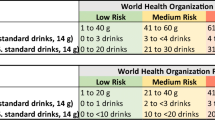Abstract
A national telephone survey on alcohol-related harms experienced by others consisted of 2,649 randomly selected adults and 415 (15 %) commented on the family member whose heavy drinking most negatively affected them. Relationships comprised close family (child, parent, sibling; 47 %), partner (22 %), extended family (e.g., aunt/uncle, cousin, grandparent; 19 %), and ex-partner (12 %). Common harms were being emotionally hurt and having a serious argument. An average of 3.4 harms was reported and multiple harms meant a higher likelihood of significant impact. Harms were classified into four domains which accounted for approximately 60 % of the explained variance: psychological (26.1 %), physical (11.4 %), social (10.9 %), and practical (9.6 %). Psychological and practical domains were associated with significant harm as were being female and sharing a home with the drinker. Perceived harms from a problematic drinking family member are broad ranging and have significant impact. Advice, information, and directions for family members dealing with a problematic drinker need development.
Similar content being viewed by others
References
American Association of Public Opinion Research. (2006). Standard definitions: Final disposition of case codes and outcome rates for surveys (4th ed.). USA: AAPOR.
Balsa, A. I., Homer, J. F., & French, M. T. (2009). The health effects of parental problem drinking on adult children. Journal of Mental Health Policy and Economics, 12, 55–66.
Benishek, L. A., Kirby, K. C., & Leggett Dugosh, K. (2011). Prevalence and frequency of problems of concerned family members with a substance-using loved one. The American Journal of Drug and Alcohol Abuse, 37, 82–88. doi:10.3109/00952990.2010.540276.
Berends, L., Ferris, J., & Laslett, A. M. (2012). A problematic drinker in the family: variations in the level of negative impact experienced by sex, relationship, and living status. Addiction, Research and Theory, 20, 300–306. doi:10.3109/16066359.2011.629061.
Beselar, C. L., Aharonovich, E., Keyes, K. M., & Hasin, D. S. (2008). Adult transition from at-risk drinking to alcohol dependence: the relationship of family history and drinking motives. Alcoholism, Clinical and Experimental Research, 32(4), 607–616. doi:10.1111/j.1530-0277.2010.01181.x.
Copello, A., & Orford, J. (2001). Addiction and the family: is it time for services to take notice of the evidence. Addiction, 97, 1361–1363. doi:10.1046/j.1360-0443.2002.00259.x.
Copello, A., Templeton, L., & Powell, J. (2009). Adult family members and carers of dependent drug users: Prevalence, social cost, resources and treatment responses. London: UK Drug Policy Commission. Retrieved 1 March 2012 from www.ukdpc.org.uk/reports.shtml.
Dube, S. R., Anda, R. F., Felitti, V. J., Chapman, D. P., Williamson, D. F., & Giles, W. H. (2001). Childhood abuse, household dysfunction, and the risk of attempted suicide throughout the life span. Findings from the adverse childhood experiences study. Journal of the American Medical Association, 26, 3089–3096. doi:10.1001/jama.286.24.3089.
Finney, J. W., Moos, R. H., Cronkite, R. C., & Gamble, W. (1983). A conceptual model of the functioning of married persons with impaired partners: spouses of alcoholic patients. Journal of Marriage and the Family, 45(1), 23–34.
Greenacre, M. J., & Blasius, J. (Eds.). (2006). Multiple correspondence analysis and related methods. Boca Raton: Chapman & Hall/CRC.
Hemström, O. (2002). Informal alcohol control in six EU countries. Contemporary Drug Problems, 29, 577–604.
Kahler, C. W., McCrady, B. S., & Epstein, E. E. (2003). Sources of distress among women in treatment with their alcoholic partners. Journal of Substance Abuse Treatment, 24, 257–265. doi:10.1016/S0740-5472(03)00033-3.
Leonard, K. E., & Eiden, R. D. (2007). Marital and family processes in the context of alcohol use and alcohol disorders. Annual Review of Clinical Psychology, 3, 285–310. doi:10.1146/annurev.clinpsy.3.022806.091424.
Loukas, A., Piejak, L. A., Bingham, C. R., Fitzgerald, H. E., & Zucker, R. A. (2001). Parental distress as a mediator of problem behaviors in sons of alcohol-involved families. Family Relations, 50(4), 293–301. doi:10.1111/j.1741-3729.2001.00293.x.
Meredith, V., & Rhys Price-Robertson, R. (2011). Alcohol misuse and child treatment. Resource sheet. National Child Protection Clearinghouse. Canberra: Australian Institute of Family Studies.
Moos, R. (2006). Social contexts and substance use. In W. R. Miller & K. M. Carroll (Eds.), Rethinking substance abuse: What the science shows, and what we should do about it (pp. 183–200). USA: The Guilford Press.
Ölafsdöttir, H., Raitasalo, K., Greenfield, T., & Allamani, A. (2009). Concern about family members’ drinking and cultural consistency: A Multi-Country GENACIS Study. Contemporary Drug Problems, 31, 59-85. Retrieved from http://www.federallegalpublications.com/contemporary-drug-problems.
Orford, J., Dalton, S., Hartney, E., Ferrins-Brown, M., Kerr, C., & Maslin, J. (2002). The close relatives of untreated heavy drinkers: perspectives on heavy drinking and its effects. Addiction Research and Theory, 10, 439–463. doi:10.1080/1606635021000034030.
Orford, J., Natera, G., Copello, A., Atkinson, C., Moral, J., Velleman, R., et al. (2005). Coping with alcohol and drug problems: The experiences of family members in three contrasting cultures. London: Routledge.
Room, R. (1994). Alcohol, drugs and the family: an overview. In annual National Conference o£ the Australian Professional Society on Alcohol and Drugs. Alcohol, Drugs and the Family (pp. 11–13).
Seljamo, S., Aromaa, M., Koivusilta, L., Rautava, P., Sourander, A., Helenius, H., et al. (2006). Alcohol use in families: a 15-year prospective follow-up study. Addiction, 101, 984–992. doi:10.1111/j.1360-0443.2006.01443.x.
StataCorp. (2009). Stata Statistical Software: Release 11. College Station: StataCorp LP.
Velleman, R., Bennett, G., Miller, T., Orford, J., Rigby, K., & Tod, A. (1993). The families of problem drug users: a study of 50 close relatives. Addiction, 88, 1281–1289. doi:10.1111/j.1360-0443.1993.tb02150.x.
Velleman, R., Templeton, L., Reuber, D., Klein, M., & Moesgen, D. (2008). Domestic abuse experienced by young people living in families with alcohol problems: results from a cross-European study. Child Abuse Review, 17, 387–409. doi:10.1002/car.1047.
WHO (2005). WHO multi-country study on women’s health and domestic violence against women: Initial results on prevalence, health outcomes and women’s responses: Summary report. Retrieved from http://www.who.int/gender/violence/who_multicountry_study/summary_report/en/index.html.
Wilkinson, C., Laslett, A. M., Ferris, J., Livingston, M., Mugavin, J., & Room, R. (2009). The range and magnitude of alcohol’s harm to others: Study design, data collection procedures and measurement. Fitzroy: AER Centre for Alcohol Policy Research, Turning Point Alcohol & Drug Centre.
Acknowledgments
This research was supported by a grant from the Foundation for Alcohol Research and Education (FARE).
Author information
Authors and Affiliations
Corresponding author
Rights and permissions
About this article
Cite this article
Berends, L., Ferris, J. & Laslett, AM. On the Nature of Harms Reported by those Identifying a Problematic Drinker in the Family, an Exploratory Study. J Fam Viol 29, 197–204 (2014). https://doi.org/10.1007/s10896-013-9570-5
Published:
Issue Date:
DOI: https://doi.org/10.1007/s10896-013-9570-5




